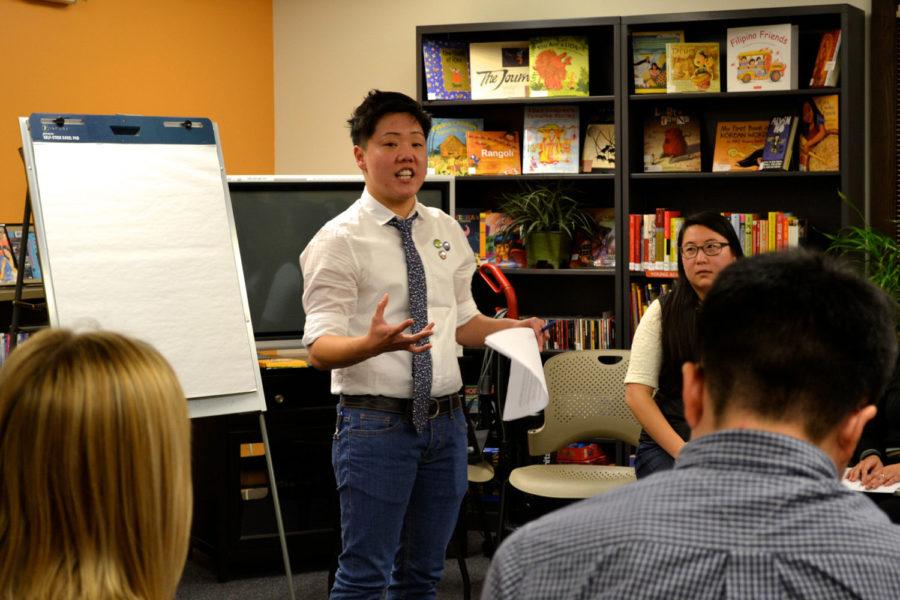Asian and Asian American students show solidarity with African-Americans on campus
S. Moon Cassinelli, graduate student in English, leads a discussion on how recent events in Ferguson relate to the Asian American community. The event was held on Tuesday evening at the Asian American House.
Dec 10, 2014
Last updated on May 10, 2016 at 11:13 p.m.
Asian and Asian American graduate students hosted a discussion in light of the non-indictment of Darren Wilson, the police officer who killed Michael Brown, an unarmed African American teenager in August 2014 in Ferguson, Missouri.
The discussion was held at the Asian American Cultural Center on Tuesday from 6 to 8 p.m. and welcomed students from diverse backgrounds on campus.
The grand jury announced on Nov. 24 that Wilson would not face a trial and the incident ignited protests and outrage across the nation. S. Moon Cassinelli, graduate student in LAS, began the planning process for the discussion over fall break in response to the national reactions that followed the grand jury decision.
“I wanted there to be other spaces for other groups to talk about this,” Cassinelli said. “So I decided to reach out to other graduate students in different departments who I know do research and are interested in these issues. I wanted to think about how to get together and create a space where we can talk about how as non-black people of color we can help support movements like
Get The Daily Illini in your inbox!
Black Lives Matter.”
Cassinelli said it was a group effort from graduate students to bring the discussion together. The discussion fostered smaller conversations with break out questions, summoning interactions between undergraduate and graduate students from different departments and majors.
“I came to the event in part because black lives matter, and I wanted to be part of an event that was continuing that momentum, particularly here on campus,” said Durell Callier, graduate student in Education. “I also came because … I wanted to show solidarity with peers and friends who are also showing solidarity with this movement.”
The event emphasized the need for solidarity and students shared their perspectives on how to take action against what they feel are injustices in the legal system.
“I see this space not just as a space to come together but also as a space of healing in some way,” said Merin Thomas, graduate student in LAS. “Communication heals and knowing that you’re not alone heals. I came for solidarity, for community and to check out what other people were thinking.”
At the heart of the discussion were the killings of Brown, Eric Garner, and other African-Americans, but things like Project 500 and the decrease in the African-American population at the University were also articulated throughout the intimate room.
In addition, the discussion brought up themes that Asian and Asian American communities face on campus and the stereotypes that follow different minority groups. These conversations highlighted Asian and Asian American history, as well as the powerful way that history connects us.
“Shared histories of violence is one way to connect groups of color, but it doesn’t have to be the only way,” Cassinelli said. “It can be about relationships to education, it could be across class lines or labor lines or gender issues.”
Ideas on how to support the African-American community and the Black Lives Matter movement surfaced through the room, bringing new leaders and voices to the forefront of the discussion.
Cassinelli emphasized the importance of standing with other ethnic groups in order to bring about change.
”Something that social activists tend to say is that being in solidarity means supporting those who are at the center of the struggle,” Cassinelli said. “It’s about thinking about our experiences on campus and thinking about how we can support the movements that are happening nationally and locally.”
Darrah can be reached at [email protected].






